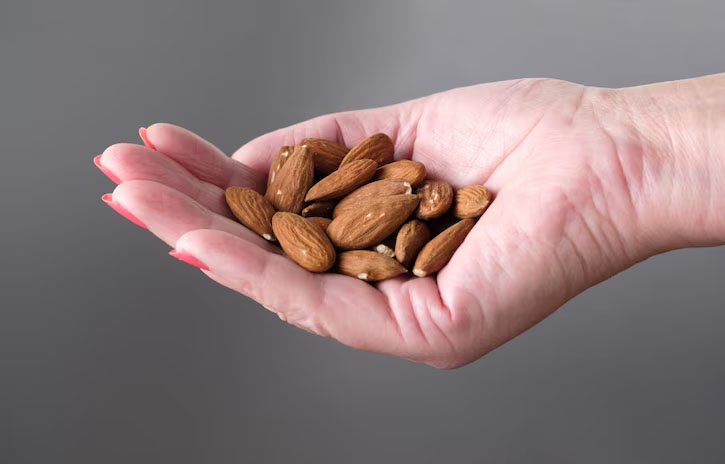Almonds are a nutrient-dense food that can support women before, during, and after pregnancy due to their rich nutritional profile. Below are their importance, nutritional benefits, and specific roles in the conception and pregnancy journey, focusing on why they are particularly beneficial for women.
Why Almonds Are Important When Trying to Conceive:
- Almonds provide key nutrients that support reproductive health and improve fertility outcomes:
- Folic Acid (Folate): Almonds contain small amounts of folate (about 7 µg per ounce), which is crucial for DNA synthesis and cell division. Adequate folate intake before conception reduces the risk of neural tube defects in the developing fetus.
- Vitamin E: Almonds are a rich source of vitamin E (7.3 mg per ounce, ~37% of the daily recommended intake), an antioxidant that protects reproductive cells from oxidative stress, potentially improving egg quality and sperm health (if considering male partners).
- Healthy Fats: Almonds are high in monounsaturated fats (about 9 g per ounce), which support hormone production, including estrogen and progesterone, critical for ovulation and maintaining a healthy menstrual cycle.
- Zinc and Selenium: These trace minerals (0.9 mg zinc and 0.7 µg selenium per ounce) support ovarian function and may enhance fertility by improving egg quality and hormonal balance.
How They Help:
Eating almonds as part of a balanced diet when trying to conceive can optimize hormonal health, enhance egg quality, and reduce oxidative damage to reproductive cells, potentially increasing the chances of successful conception.
Nutritional Benefits
A 1-ounce (28g, ~23 almonds) serving provides:
- Calories: ~161 kcal
- Protein: 6 g (supports tissue repair and growth) Fat: 14 g (mostly monounsaturated, heart-healthy fats)
- Carbohydrates: 6 g (with 3.5 g fiber for digestive health) Vitamin E: 7.3 mg (antioxidant, protects cells)
- Magnesium: 76 mg (~19% of daily needs, helps nerve and muscle function)
- Folate: 7 µg (supports early fetal development)
- Calcium: 76 mg (~8% of daily needs, for bone health)
- Iron: 1 mg (~6% of daily needs, maintains oxygen transport)
- Zinc and Selenium: Trace amounts for immune and reproductive health.
These nutrients collectively support overall health, energy levels, and reproductive function, making almonds a valuable addition to a fertility-focused diet.
Almonds Before Pregnancy
-
Hormonal Balance: The healthy fats and vitamin E in almonds support the production of reproductive hormones, aiding regular ovulation.
-
Antioxidant Protection: Vitamin E and other antioxidants reduce oxidative stress, which can otherwise impair egg quality or ovulation.
-
Blood Sugar Regulation: The fiber, protein, and fat combo helps stabilize blood sugar, necessary for women with conditions like PCOS that can affect fertility.
-
Nutrient Stores: Building nutrient reserves (e.g., folate, iron, calcium) prepares the body for pregnancy demands.
Practical Tip:
A small handful (1 oz) daily, combined with a balanced diet, can provide these benefits without excessive calories.
Almonds During Pregnancy Fetal Development:
- Folate supports neural tube formation in the first trimester, while calcium and magnesium aid bone and organ development.
- Energy and Nutrient Needs: Pregnancy increases energy and nutrient demands. Almonds provide a nutrient-dense, calorie-rich snack to meet these needs.
- Blood Health: Iron supports increased blood volume and prevents anemia, familiar in pregnancy.
- Digestive Health : Fiber (3.5 g per ounce) helps prevent constipation, a frequent pregnancy issue.
- Gestational Diabetes Management: The low glycemic index of almonds helps regulate blood sugar, lowering the possibility of gestational diabetes difficulties.
Practical Tip:
Incorporate almonds into snacks or meals (e.g., almond butter on toast and chopped almonds in yogurt) to maintain steady energy and nutrient intake.
Almonds After Pregnancy Lactation Support:
- Protein, healthy fats, and calcium support milk production and maternal recovery. Magnesium aids muscle relaxation, helping with postpartum recovery.
- Energy Boost: New mothers often face fatigue; almonds provide a quick, nutrient-packed energy source.
- Bone Health: Calcium and magnesium support bone strength, which is crucial as breastfeeding can deplete maternal calcium stores.
- Weight Management: The fiber and protein promote satiety, helping with postpartum weight management when consumed in moderation.
Practical Tip:
A small serving (1–2 oz) on a daily basis can support recovery and lactation without overloading calories.
Why It Is Necessary For Women’s Reproductive Health:
Almonds provide nutrients like vitamin E, zinc, and healthy fats demanded for ovulation, egg quality, and hormonal balance, addressing common fertility challenges.
Pregnancy Support:
Folate, calcium, iron, and magnesium, all support fetal development and maternal health, reducing risks like neural tube defects or anemia.
Long-Term Health:
Almonds promote heart health (via monounsaturated fats), bone health (calcium, magnesium), and antioxidant protection, which are vital for women across life stages, especially during the high-demand periods of pregnancy and postpartum.
Convenience and Versatility:
Almonds are portable, shelf-stable, and easy to incorporate into diets, making them practical for busy women.
Considerations
Moderation:
Almonds are calorie-dense, so 1–2 ounces daily is sufficient to avoid excess calorie intake.
Allergies:
Women with nut allergies should avoid almonds and consult a dietitian for alternatives.
Variety:
Almonds should complement, not replace, other nutrient sources like leafy greens, lean proteins, and whole grains for a balanced diet.
Conclusion: Almonds are a powerhouse food for women trying to conceive, during pregnancy, and postpartum due to their rich content of folate, vitamin E, healthy fats, and essential minerals. They support hormonal balance, fetal development, maternal recovery, and long-term health. A daily serving of 1–2 ounces, integrated into a varied diet, can provide these benefits effectively.

